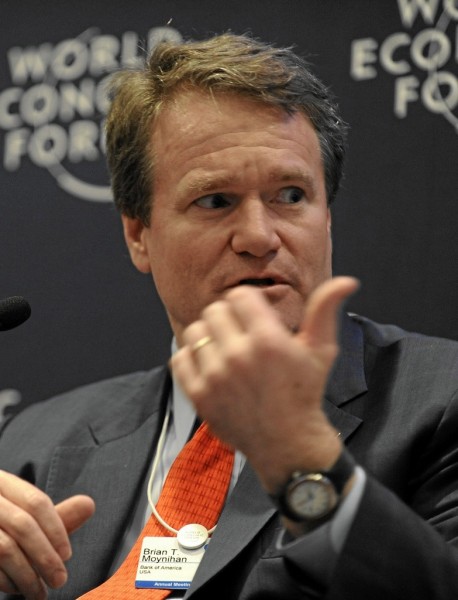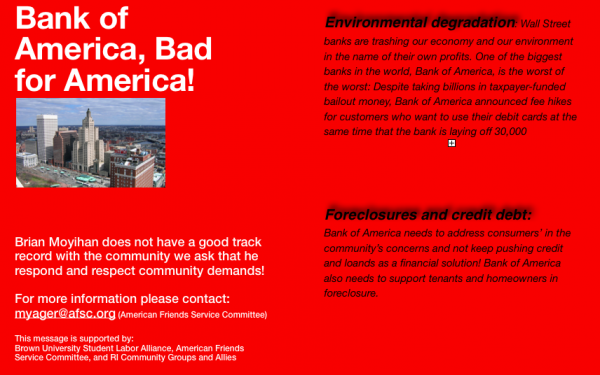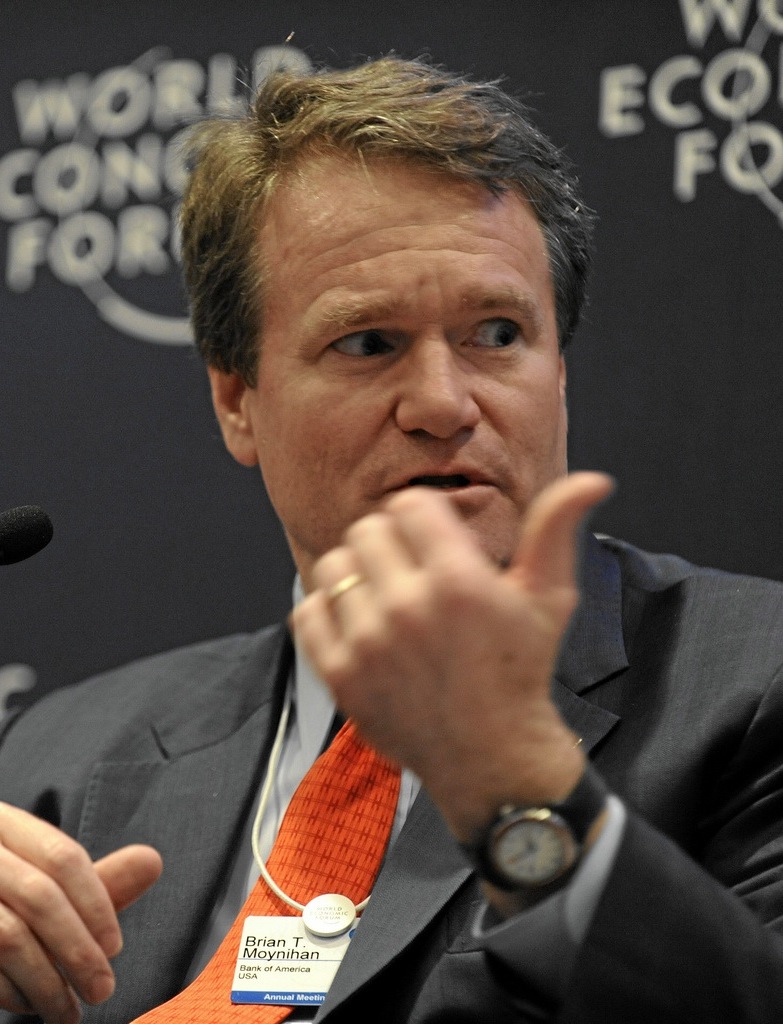
Brian Moynihan’s turn as this year’s guest of the Darrell West Lecture Series was interesting for all the wrong reasons.
Moynihan is the CEO of Bank of America, an institution suffering from an abundance of controversies. The lecture series “was founded to provide an open forum on the intersection between religion and politics” and in the past has hosted Ayaan Hirsi Ali and Elaine Pagels. Moynihan was invited to talk about his philanthropic work in the context of being the CEO of one of the most powerful financial institutions in the world. The event was billed as a discussion about “the role of philanthropy and corporate social responsibility” in today’s society.
Outside the Central Congregational Church where the event was held, police shooed away peaceful protesters handing out informational flyers critical of Moynihan and Bank of America. The Brown Student Labor Alliance’s Stoni Tomson sent a letter acknowledging the churches “best intentions” in inviting Moynihan while decrying “Bank of America’s track record of predatory lending schemes that targeted people of color which directly contributed to the financial crisis of 2008, the financing of ecocidal practices like mountaintop removal mining, and the exploitative treatment of its call-center workers.”
Tomson said, “We believe that Moynihan’s lecture on Corporate Social Responsibility will inevitably be fraught with hypocrisy that effectively makes congregation members pawns in a Bank of America Public Relations Stunt.”
The interview conducted by Darrell West avoided negativity and focused on Moynihan’s philanthropic efforts in Haiti, and the questions too often allowed Moynihan to deliver corporate spiels that sounded more like advertisements for Bank of America than serious considerations of the issues involved. For instance, in answer to a question regarding the controversial nature of large financial institutions like Bank of America in the light of the financial meltdown, Moynihan talked about the excellent ratings the bank receives from satisfied customers, saying “We do lots of customer research. Our customer satisfaction is as high today as it was in 2007.”

When asked about the role of faith in his life, Moynihan invoked the Golden Rule in a way I never thought possible when he claimed that the principle of being customer focused in business “is not all that different from treating others as you want to be treated yourself.”
During the question and answer period things got edgier as Central Congregational Church member Paul Armstrong said, “Let me quote a few lines from a press release issued by the Securities and Exchange Commission last August as they settled a $245 million case which was part of a larger $16.5 billion settlement which Bank of America reached with the Department of Justice to resolve various investigations involving violations of laws relating to the sale of toxic mortgage backed securities. The regional director of the SEC’s office said, ‘Bank of America failed to make accurate and complete disclosure to investors and its illegal conduct kept investors in the dark. Requiring an admission of wrongdoing as part of Bank of America’s agreement to resolve the SEC charges filed today provides an additional level of accountability for its violation of the federal securities laws.’
“My question to you is this,” continued Armstrong, “What is the relationship between the illegal conduct the organization you lead has engaged in and your personal philanthropy? Is philanthropy morally tainted if it’s funded by illegal acts? Can philanthropy redeem wrongdoing behind the fortunes you make possible?”
Tough questions, which Moynihan awkwardly sidestepped as he maintained that it would take days to walk the audience through the complexities of the mortgage crisis. He then claimed that Bank of America “ended up trying to help people keep their homes,” before adding “We do lot’s of good work… it’s all consistent with what we do [as a company.]”
The kind of good work Bank of America is known for can be seen in this Huffington Post piece, where “former employees said they were told to falsify electronic records and string homeowners along in foreclosure as long as possible.” I suppose that’s one way to keep people in their homes.
Moynihan also backed away from accepting a “level of accountability” for Bank of America’s illegal actions, saying that his company only settled with the government because it was the cheaper course of action. “We settled,” said Moynihan, “because it was in the best interest of or customers to do so.”
Armstrong’s question deserves better answers from proponents of corporate philanthropy. Serious questions have been raised about the “charitable industrial complex” with even multi-millionaires such as Peter Buffett, Warren Buffett’s son, asking, “Is progress really Wi-Fi on every street corner? No. It’s when no 13-year-old girl on the planet gets sold for sex. But as long as most folks are patting themselves on the back for charitable acts, we’ve got a perpetual poverty machine. “
If there is a perpetual poverty machine, then Bank of America is a huge part of it, because while Moynihan’s efforts in providing education for exceptional Haitian youth are indeed laudable, the CEO, making well over $13 million a year, runs a company in which one-third of its bank tellers rely on public assistance and “has had more complaints filed with the Consumer Financial Protection Bureau than any other American financial institution.”
Working conditions at the Bank of America call center are so bad there’s an online petition demanding “adequate job training that keeps jobs and customers safe” that everyone reading this should consider signing.
I’d like to believe that Moynihan was invited so as to expose the hypocrisy and self-serving nature of so-called corporate philanthropy, but unfortunately, I think the invitation was sincere, and therefore misguided.


